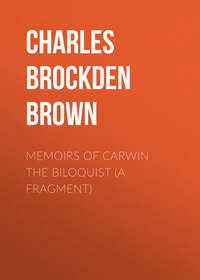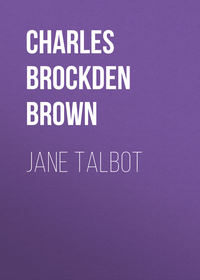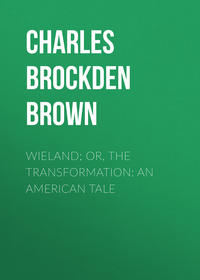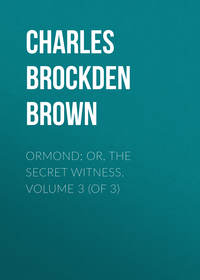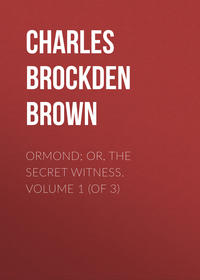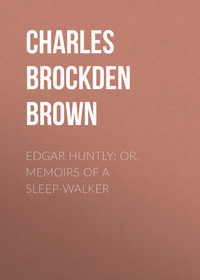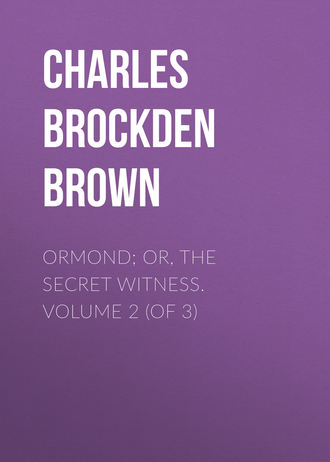 полная версия
полная версияOrmond; Or, The Secret Witness. Volume 2 (of 3)
An uncommon degree of skill was required to introduce this topic so as to avoid the imputation of an insult. This scheme was little in unison with all her preconceived notions. No doubt the irksomeness of her present situation, the allurements of luxury and ease which Ormond had to bestow, and the revival of her ancient independence and security, had some share in dictating her assent.
Her concurrence was by no means cordial and unhesitating. Remorse and the sense of dishonour pursued her to her retreat, though chosen with a view of shunning their intrusions; and it was only when the reasonings and blandishments of her lover were exhibited, that she was lulled into temporary tranquillity.
She removed to Philadelphia. Here she enjoyed all the consolations of opulence. She was mistress of a small but elegant mansion. She possessed all the means of solitary amusement, and frequently enjoyed the company of Ormond. These however were insufficient to render her happy. Certain reflections might, for a time, be repressed as divested of their sting, but they insinuated themselves at every interval, and imparted to her mind a hue of rejection from which she could not entirely relieve herself.
She endeavoured to acquire a relish for the pursuits of literature, by which her lonely hours might be cheered; but of this, even in the blithsomeness and serenity of her former days, she was incapable; – much more so now when she was the prey of perpetual inquietude. Ormond perceived this change, not without uneasiness. All his efforts to reconcile her to her present situation were fruitless. They produced a momentary effect upon her. The softness of her temper and her attachment to him would, at his bidding, restore her to vivacity and ease, but the illumination seldom endured longer than his presence and the novelty of some amusement with which he had furnished her.
At his next visit, perhaps, he would find that a new task awaited him. She indulged herself in no recriminations or invectives. She could not complain that her lover had deceived her. She had voluntarily and deliberately accepted the conditions prescribed. She regarded her own disposition to repine as a species of injustice. She laid no claim to an increase of tenderness. She hinted not a wish for a change of situation; yet she was unhappy. Tears stole into her eyes, and her thoughts wandered into gloomy reverie, at moments when least aware of their reproach, and least willing to indulge them.
Was a change to be desired? Yes; provided that change was equally agreeable to Ormond, and should be seriously proposed by him: of this she had no hope. As long as his accents rung in her ears, she even doubted whether it were to be wished. At any rate, it was impossible to gain his approbation to it. Her destiny was fixed. It was better than the cessation of all intercourse, yet her heart was a stranger to all permanent tranquillity.
Her manners were artless and ingenuous. In company with Ormond her heart was perfectly unveiled. He was her divinity, to whom every sentiment was visible, and to whom she spontaneously uttered what she thought, because the employment was pleasing; because he listened with apparent satisfaction; and because, in fine, it was the same thing to speak and to think in his presence. There was no inducement to conceal from him the most evanescent and fugitive ideas.
Ormond was not an inattentive or indifferent spectator of those appearances. His friend was unhappy. She shrunk aghast from her own reproaches and the censure of the world. This morbid sensibility he had endeavoured to cure, but hitherto in vain. What was the amount of her unhappiness? Her spirits had formerly been gay; but her gaiety was capable of yielding place to soul-ravishing and solemn tenderness, after sedateness was, at those times, the offspring not of reflection but of passion. There still remained much of her former self. He was seldom permitted to witness more than the traces of sorrow. In answer to his inquiries, she, for the most part, described sensations that were gone, and which she flattered herself and him would never return; but this hope was always doomed to disappointment. Solitude infallibly conjured up the ghost which had been laid, and it was plain that argument was no adequate remedy for this disease.
How far would time alleviate its evils? When the novelty of her condition should disappear, would she not regard it with other eyes? By being familiar with contempt, it will lose its sting; but is that to be wished? Must not the character be thoroughly depraved before the scorn of our neighbours shall become indifferent? Indifference, flowing from a sense of justice, and a persuasion that our treatment is unmerited, is characteristic of the noblest minds; but indifference to obloquy, because we are habituated to it is a token of peculiar baseness. This, therefore, was a remedy to be ardently deprecated.
He had egregiously overrated the influence of truth and his own influence. He had hoped that his victory was permanent. In order to the success of truth, he was apt to imagine that nothing was needful but opportunities for a complete exhibition of it. They that inquire and reason with sufficient deliberateness and caution must inevitably accomplish their end. These maxims were confuted in the present case. He had formed no advantageous conceptions of Helena's capacity. His aversion to matrimony arose from those conceptions; but experience had shown him that his conclusions, unfavourable as they were, had fallen short of the truth. Convictions, which he had conceived her mind to be sufficiently strong to receive and retain, were proved to have made no other than a momentary impression. Hence his objections to ally himself to a mind inferior to his own were strengthened rather than diminished. But he could not endure the thought of being instrumental to her misery.
Marriage was an efficacious remedy, but he could not as yet bring himself to regard the aptitude of this cure as a subject of doubt. The idea of separation sometimes occurred to him. He was not unapprehensive of the influence of time and absence in curing the most vehement passion, but to this expedient the lady could not be reconciled. He knew her too well to believe that she would willingly adopt it. But the only obstacle to this scheme did not flow from the lady's opposition. He would probably have found upon experiment as strong an aversion to adopt it in himself as in her.
It was easy to see the motives by which he would be likely to be swayed into a change of principles. If marriage were the only remedy, the frequent repetition of this truth must bring him insensibly to doubt the rectitude of his determinations against it. He deeply reflected on the consequences which marriage involves. He scrutinised with the utmost accuracy the character of his friend, and surveyed it in all its parts. Inclination could not fail of having some influence on his opinions. The charms of this favourite object tended to impair the clearness of his view, and extenuate or conceal her defects. He entered on the enumeration of her errors with reluctance. Her happiness, had it been wholly disconnected with his own, might have had less weight in the balance, but now, every time the scales were suspended, this consideration acquired new weight.
Most men are influenced in the formation of this contract, by regards purely physical. They are incapable of higher views. They regard with indifference every tie that binds them to their contemporaries, or to posterity. Mind has no part in the motives that guide them. They choose a wife as they choose any household movable, and when the irritation of the senses has subsided, the attachment that remains is the offspring of habit.
Such were not Ormond's modes of thinking. His creed was of too extraordinary a kind not to merit explication. The terms of this contract were, in his eyes, iniquitous and absurd. He could not think with patience of a promise which no time could annul, which pretended to ascertain contingencies and regulate the future. To forego the liberty of choosing his companion, and bind himself to associate with one whom he despised; to raise to his own level whom nature had irretrievably degraded; to avow and persist in his adherence to a falsehood, palpable and loathsome to his understanding; to affirm that he was blind, when in full possession of his senses; to shut his eyes and grope in the dark, and call upon the compassion of mankind on his infirmity, when his organs were in no degree impaired, and the scene around him was luminous and beautiful, – was an height of infatuation that he could never attain. And why should he be thus self-degraded? Why should he take a laborious circuit to reach a point which, when attained, was trivial, and to which reason had pointed out a road short and direct?
A wife is generally nothing more than a household superintendent. This function could not be more wisely vested than it was at present. Every thing in his domestic system was fashioned on strict and inflexible principles. He wanted instruments and not partakers of his authority, – one whose mind was equal and not superior to the cogent apprehension and punctual performance of his will; one whose character was squared with mathematical exactness, to his situation. Helena, with all her faults, did not merit to be regarded in this light. Her introduction would destroy the harmony of his scheme, and be, with respect to herself, a genuine debasement. A genuine evil would thus be substituted for one that was purely imaginary.
Helena's intellectual deficiencies could not be concealed. She was a proficient in the elements of no science. The doctrine of lines and surfaces was as disproportionate with her intellects as with those of the mock-bird. She had not reasoned on the principles of human action, nor examined the structure of society. She was ignorant of the past or present condition of mankind. History had not informed her of the one, nor the narratives of voyagers, nor the deductions of geography of the other. The heights of eloquence and poetry were shut out from her view. She could not commune in their native dialect with the sages of Rome and Athens. To her those perennial fountains of wisdom and refinement were sealed. The constitution of nature, the attributes of its author, the arrangement of the parts of the external universe, and the substance, modes of operation, and ultimate destiny of human intelligence, were enigmas unsolved and insoluble by her.
But this was not all. The superstructure could for the present be spared. Nay, it was desirable that the province of rearing it should be reserved for him. All he wanted was a suitable foundation; but this Helena did not possess. He had not hitherto been able to create in her the inclination or the power. She had listened to his precepts with docility. She had diligently conned the lessons which he had prescribed, but the impressions were as fleeting as if they had been made on water. Nature seemed to have set impassable limits to her attainments.
This indeed was an unwelcome belief. He struggled to invalidate it. He reflected on the immaturity of her age. What but crude and hasty views was it reasonable to expect at so early a period? If her mind had not been awakened, it had proceeded, perhaps from the injudiciousness of his plans, or merely from their not having been persisted in. What was wanting but the ornaments of mind to render this being all that poets have feigned of angelic nature? When he indulged himself in imaging the union of capacious understanding with her personal loveliness, his conceptions swelled to a pitch of enthusiasm, and it seemed as if no labour was too great to be employed in the production of such a creature. And yet, in the midst of his glowings, he would sink into sudden dejection at the recollection of that which passion had, for a time, excluded. To make her wise it would be requisite to change her sex. He had forgotten that his pupil was a female, and her capacity therefore limited by nature. This mortifying thought was outbalanced by nature. Her attainments, indeed, were suitable to the imbecility of her sex; but did she not surpass in those attainments, the ordinary rate of women? They must not be condemned, because they are outshone by qualities that are necessarily male births.
Her accomplishments formed a much more attractive theme. He overlooked no article in the catalogue. He was confounded at one time, and encouraged at another, on remarking the contradictions that seemed to be included in her character. It was difficult to conceive the impossibility of passing that barrier which yet she was able to touch. She was no poet. She listened to the rehearsal without emotion, or was moved, not by the substance of the passage, by the dazzling image, or the magic sympathy, but by something adscititious; yet, usher her upon the stage, and no poet could wish for a more powerful organ of his conceptions. In assuming this office, she appeared to have drank in the very soul of the dramatist. What was wanting in judgement was supplied by memory, in the tenaciousness of which she has seldom been rivalled.
Her sentiments were trite and undigested, but were decorated with all the fluences and melodies of elocution. Her musical instructor had been a Sicilian, who had formed her style after the Italian model. This man had likewise taught her his own language. He had supplied her chiefly with Sicilian compositions, both in poetry and melody, and was content to be unclassical, for the sake of the feminine and voluptuous graces of his native dialect.
Ormond was an accurate judge of the proficiency of Helena, and of the felicity with which these accomplishments were suited to her character. When his pupil personated the victims of anger and grief, and poured forth the fiery indignation of Calista, or the maternal despair of Constantia, or the self-contentions of Ipsipile, he could not deny the homage which her talents might claim.
Her Sicilian tutor had found her no less tractable as a votary of painting. She needed only the education of Angelica to exercise as potent and prolific a pencil. This was incompatible with her condition, which limited her attainments to the element of this art. It was otherwise with music. Here there was no obstacle to skill, and here the assiduities of many years in addition to a prompt and ardent genius, set her beyond the hopes of rivalship.
Ormond had often amused his fancy with calling up images of excellences in this art. He saw no bounds to the influence of habit, in augmenting the speed and multiplying the divisions of muscular motion. The fingers, by their form and size, were qualified to outrun and elude the most vigilant eye. The sensibility of keys and wires had limits; but these limits depended on the structure of the instrument, and the perfection of its structure was proportioned to the skill of the artist. On well-constructed keys and strings, was it possible to carry diversities of movement and pressure too far? How far they could be carried was mere theme of conjecture, until it was his fate to listen to the magical performances of Helena, whose volant finger seemed to be self-impelled. Her touches were creative of a thousand forms of piano, and of numberless transitions from grave to quick, perceptible only to ears like her own.
In the selection and arrangement of notes there are no limits to luxuriance and celerity. Helena had long relinquished the drudgery of imitation. She never played but when there were motives to fervour, and when she was likely to ascend without impediment, and to maintain for a suitable period her elevation, to the element of new ideas. The lyrics of Milton and of Metastasio she sung with accompaniments that never tired, because they were never repeated. Her harp and clavichord supplied her with endless combinations, and these, in the opinion of Ormond, were not inferior to the happiest exertions of Handel and Arne.
Chess was his favourite amusement. This was the only game which he allowed himself to play. He had studied it with so much zeal and success, that there were few with whom he deigned to contend. He was prone to consider it as a sort of criterion of human capacity. He who had acquired skill in this science could not be infirm in mind; and yet he found in Helena a competitor not unworthy of all his energies. Many hours were consumed in this employment, and here the lady was sedate, considerate, extensive in foresight, and fertile in expedients.
Her deportment was graceful, inasmuch as it flowed from a consciousness of her defects. She was devoid of arrogance and vanity, neither imagining herself better than she was, and setting light by those qualifications which she unquestionably possessed. Such was the mixed character of this woman.
Ormond was occupied with schemes of a rugged and arduous nature. His intimate associates and the partakers of his confidence were imbued with the same zeal and ardent in the same pursuits. Helena could lay no claim to be exalted to this rank. That one destitute of this claim should enjoy the privileges of his wife was still a supposition truly monstrous. Yet the image of Helena, fondly loving him, and a model as he conceived of tenderness and constancy, devoured by secret remorse, and pursued by the scorn of mankind, – a mark for slander to shoot at, and an outcast of society, – did not visit his meditations in vain. The rigour of his principles began now to relent.
He considered that various occupations are incident to every man. He cannot be invariably employed in the promotion of one purpose. He must occasionally unbend, if he desires that the springs of his mind should retain their full vigour. Suppose his life were divided between business and amusement. This was a necessary distribution, and sufficiently congenial with his temper. It became him to select with skill his sources of amusement. It is true that Helena was unable to participate in his graver occupations: what then? In whom were blended so many pleasurable attributes? In her were assembled an exquisite and delicious variety. As it was, he was daily in her company. He should scarcely be more so if marriage should take place. In that case, no change in their mode of life would be necessary. There was no need of dwelling under the same roof. His revenue was equal to the support of many household establishments. His personal independence would remain equally inviolable. No time, he thought, would diminish his influence over the mind of Helena, and it was not to be forgotten that the transition would to her be happy. It would reinstate her in the esteem of the world, and dispel those phantoms of remorse and shame by which she was at present persecuted.
These were plausible considerations. They tended at least to shake his resolutions. Time would probably have completed the conquest of his pride, had not a new incident set the question in a new light.
CHAPTER IV
The narrative of Melbourne made a deeper impression on the mind of his guest than was at first apparent. This man's conduct was directed by the present impulse; and, however elaborate his abstract notions, he seldom stopped to settle the agreement between his principles and actions. The use of money was a science like every other branch of benevolence, not reducible to any fixed principles. No man, in the disbursement of money, could say whether he was conferring a benefit or injury. The visible and immediate effects might be good, but evil was its ultimate and general tendency. To be governed by a view to the present rather than the future was a human infirmity from which he did not pretend to be exempt. This, though an insufficient apology for the conduct of a rational being, was suitable to his indolence, and he was content in all cases to employ it. It was thus that he reconciled himself to beneficent acts, and humourously held himself up as an object of censure, on occasions when most entitled to applause.
He easily procured information as to the character and situation of the Dudleys. Neighbours are always inquisitive, and happily, in this case, were enabled to make no unfavourable report. He resolved without hesitation to supply their wants. This he performed in a manner truly characteristic. There was a method of gaining access to families, and marking them in their unguarded attitudes, more easy and effectual than any other: it required least preparation and cost least pains; the disguise, also, was of the most impenetrable kind. He had served a sort of occasional apprenticeship to the art, and executed its functions with perfect ease. It was the most entire and grotesque metamorphosis imaginable. It was stepping from the highest to the lowest rank in society, and shifting himself into a form as remote from his own as those recorded by Ovid. In a word, it was sometimes his practice to exchange his complexion and habiliments for those of a negro and a chimney-sweep, and to call at certain doors for employment. This he generally secured by importunities, and the cheapness of his services.
When the loftiness of his port, and the punctiliousness of his nicety were considered, we should never have believed – what yet could be truly asserted – that he had frequently swept his own chimneys, without the knowledge of his own servants.1 It was likewise true, though equally incredible, that he had played at romps with his scullion, and listened with patience to a thousand slanders on his own character.
In this disguise he visited the house of Mr. Dudley. It was nine o'clock in the morning. He remarked with critical eyes, the minutest circumstance in the appearance and demeanour of his customers, and glanced curiously at the house and furniture. Every thing was new and every thing pleased. The walls, though broken into roughness by carelessness or time, were adorned with glistening white. The floor, though loose and uneven, and with gaping seams, had received all the improvements which cloth and brush could give. The pine tables, rush chairs, and uncurtained bed, had been purchased at half price, at vendue, and exhibited various tokens of decay; but care and neatness and order were displayed in their condition and arrangement.
The lower apartment was the eating and sitting room. It was likewise Mr. Dudley's bed chamber. The upper room was occupied by Constantia and Lucy. Ormond viewed every thing with the accuracy of an artist, and carried away with him a catalogue of every thing visible. The faded form of Mr. Dudley, that still retained its dignity, the sedateness, graceful condescension, and personal elegance of Constantia, were new to the apprehension of Ormond. The contrast between the house and its inhabitants rendered the appearance more striking. When he had finished his task he retired, but returning in a quarter of an hour, he presented a letter to the young lady. He behaved as if by no means desirous of eluding her interrogatories, and, when she desired him to stay, readily complied. The letter, unsigned, and without superscription, was to this effect: —
"The writer of this is acquainted with the transaction between Thomas Craig and Mr. Dudley. The former is debtor to Mr. Dudley in a large sum. I have undertaken to pay as much of this debt, and at such times, as suits my convenience. I have had pecuniary engagements with Craig. I hold myself, in the sum enclosed, discharging so much of his debt. The future payments are uncertain, but I hope they will contribute to relieve the necessities of Mr. Dudley."
Ormond had calculated the amount of what would be necessary for the annual subsistence of this family on the present frugal plan. He had regulated his disbursements accordingly.
It was natural to feel curiosity as to the writer of this epistle. The bearer displayed a prompt and talkative disposition. He had a staring eye and a grin of vivacity forever at command. When questioned by Constantia, he answered that the gentleman had forbidden him to mention his name or the place where he lived. Had he ever met with the same person before? O yes. He had lived with him from a child. His mother lived with him still, and his brothers. His master had nothing for him to do at home, so he sent him out sweeping chimneys, taking from him only half the money that he earned that way. He was a very good master.
"Then the gentleman had been a long time in the city?"
"O yes. All his life he reckoned. Ho used to live in Walnut Street, but now he's moved down town." Here he checked himself, and added, – "But I forgets. I must not tell where he livest. He told me I must'nt."


